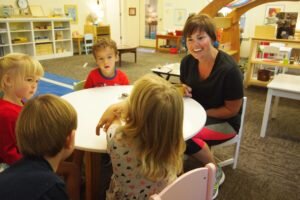Cider and Conversation
I just love homemade apple cider. I mean, what’s not to love? It’s warm and sweet, it has all the spices that make you think of the holidays, and if you make it in a crockpot, the entire house smells like one enormous pie. I wanted to bring this experience into the Otter class where I work as an assistant teacher, so I asked my lead teacher Annie about it and she was instantly on board—she knows the magic of homemade apple cider. It’s one of many reasons I love her.
We recruited a classroom parent to help, split our students into three groups, and set to work. The children washed and sliced the apples, counted out the cinnamon sticks and nutmeg, pushed whole cloves into oranges and took turns running excitedly back and forth from the sink to the slow-cookers, adding the required cups of water. The room was abuzz with children who’d been given the solemn responsibility of creating something special. They felt empowered and important. We turned the slow-cookers on and let the magic happen overnight. We returned to a classroom that was cozy and smelled absolutely incredible.
Earlier that week, our children had created invitations to each of the teachers at our school to stop by for a mug of cider. We’d explained that when the teachers arrived at our classroom door, we’d choose a few children to greet our guests. This is where the Montessori principles come in.
Grace and courtesy are an integral part of the Montessori curriculum beginning in the primary classroom and continuing throughout the rest of a child’s schooling. Maria Montessori believed that children crave the skills that will help them navigate friendships and social situations, and lessons in grace and courtesy give them the language, actions and framework to help them feel successful. In our class, we practice holding the door for guests, greeting visitors, interrupting adults in a respectful manner, participating in polite conversation and welcoming newcomers to our classroom. The children are always eager to extend a word of welcome and their faces beam with pride—they feel proud of the positive reactions their kindness elicits.
As the teachers began arriving at our classroom for their cider, our Otters eagerly greeted them, walked them over to a carefully-prepared table and poured them a cup of cider from our teapot. They sat down and conversed with the adult without even a mention of a cup of cider for themselves. They were happy to take care of someone else. They were tickled at the thought of having a conversation with a teacher. They sat crowded around our tiny table, jostling and jockeying for position, just so that they could be part of the conversation. At one point the table was full and I watched as one of our Otters, realizing there wasn’t room for him, dejectedly said, “Aww, man. I was really wanting to conversation, too!”
I think back at this happy day with pride: our three, four and five-year-olds were eagerly taking turns, serving others, and waiting patiently for their own cider while regaling the adults with stories of how they made the drink and what ingredients they used. To listen in on their polite conversations was such a joy. They enthusiastically tidied up the table, washed out mugs, wiped down the teapot and escorted our guests to the door. They were the ones taking care of adults, doing as they’ve seen their parent do since they were born, and feeling empowered by both their responsibility and autonomy.
There really is something magical about a mug of warm cider, a gaggle of happy faces serving it, and the love behind it all.
Written by Morgan Sprinkle


